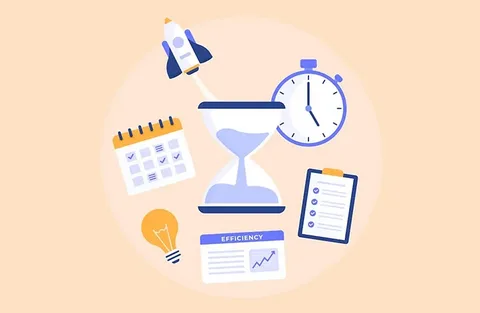Procrastination is one of those invisible problems that most of us struggle with but rarely talk about openly. Whether you are a student delaying assignments, a professional postponing important tasks, or even an entrepreneur stuck in the cycle of “I’ll start tomorrow,” procrastination silently eats away at productivity, opportunities, and peace of mind.
Over the past decade, dozens of productivity apps have popped up—ranging from to-do list managers and habit trackers to Pomodoro timers and note-taking tools. While many of these apps provide temporary motivation, they often fail to address the deeper, psychological roots of procrastination. This is exactly where the Mellow Flow App stands out, offering a CBT-based approach that doesn’t just manage tasks but helps rewire the mindset behind procrastination itself.
That’s why a new wave of productivity tools based on Cognitive Behavioral Therapy (CBT) is gaining attention. These apps don’t just remind you to work—they help you understand why you avoid tasks, and then guide you to change your mindset from the inside out.
In this article, we’ll explore how CBT-based apps are changing the productivity game, what makes them effective, which apps are leading the way, and why this shift could redefine how we fight procrastination in the digital age.
Table of Contents
The Problem with Traditional Productivity Apps
Most traditional productivity apps operate on the principle of external motivation. They use tools like:
Reminders to nudge you to complete tasks.
Timers like the Pomodoro technique to break tasks into smaller chunks.
Habit trackers to gamify progress and reward consistency.
While these approaches are helpful, they often only scratch the surface. For someone dealing with procrastination, anxiety, perfectionism, or ADHD, a notification on your phone isn’t enough to overcome the deep-rooted resistance to starting or finishing tasks.
Here’s the truth: procrastination isn’t a time-management issue—it’s an emotional regulation issue.
You don’t avoid tasks because you don’t know how to plan your time. You avoid them because of fear of failure, lack of confidence, or even the discomfort of starting something you might not enjoy. Traditional productivity apps rarely address these emotional layers. That’s why tools like the Mellow Flow App are gaining attention—they focus on emotional triggers as much as task management.
Instead of just sending reminders, the Mellow Flow App guides you through CBT-based exercises that help you reframe negative thoughts and build healthier habits. Over time, this approach feels less like using another productivity app and more like having a personal coach who helps you tackle procrastination at its root.
What Makes CBT Different?
Cognitive Behavioral Therapy (CBT) is a psychological approach widely used to treat anxiety, depression, and behavioral issues. It works by breaking down thought patterns into three components:
- Thoughts – What we tell ourselves internally.
- Emotions – How those thoughts make us feel.
- Behaviors – The actions we take as a result.
For procrastinators, the thought might be: “I’m going to fail at this task.”
The emotion: anxiety or fear.
The behavior: avoiding the task altogether.
CBT teaches people to identify these patterns, challenge negative thoughts, and replace them with constructive actions. When adapted into an app, CBT transforms into short, guided lessons that help you catch your own mental habits in the moment.
This approach is powerful because it doesn’t just remind you to work—it helps you understand why you’re stuck and gives you tools to move forward.
Why CBT-Based Productivity Apps Are the Future
Here are some reasons why CBT-driven apps stand out compared to traditional ones:
- They Focus on the Root Cause
Instead of focusing only on what tasks need to be done, they explore why you’re avoiding them. Apps like the Mellow Flow App make these changes more long-lasting by addressing procrastination at its root. - They Encourage Self-Awareness
Daily reflections and exercises help users recognize destructive thought patterns that fuel procrastination. The Mellow Flow App uses CBT-based prompts to build this awareness step by step. - They’re More Personalized
Unlike one-size-fits-all reminders, CBT-based apps adapt based on your emotional triggers and behavioral tendencies. That’s why the Mellow Flow App feels tailored instead of generic. - They Support Mental Well-Being
By tackling both productivity and mental health, these apps improve focus, reduce stress, and enhance overall life satisfaction. Users of the Mellow Flow App often report feeling calmer and more motivated at the same time. - They Are Research-Backed
CBT is a proven therapeutic approach. By integrating it into digital platforms, apps like the Mellow Flow App bridge psychology and technology in a way that genuinely helps people.
Example: The Rise of Mellow Flow
One of the most discussed CBT-based apps today is Mellow Flow, a tool designed to help users overcome procrastination using short, science-backed daily lessons.
Unlike standard to-do apps, Mellow Flow combines guided exercises, reflections, and CBT techniques to target the emotional roots of procrastination. It doesn’t just ask you to make a list—it teaches you how to handle fear of failure, perfectionism, and mental blocks.
If you want a deeper dive into how this app works in practice, check out this Mellow Flow App Review, where you’ll find a detailed breakdown of its features, pros, and cons.
The popularity of Mellow Flow shows that users are no longer satisfied with surface-level productivity hacks—they want something meaningful that actually rewires habits.
Comparing CBT-Based Apps vs. Habit Trackers
| Feature | Traditional Apps (Habit Trackers, Timers) | CBT-Based Apps |
|---|---|---|
| Approach | External motivation (reminders, gamification) | Internal motivation (thought & behavior change) |
| Focus | Task completion | Root cause of procrastination |
| Effectiveness | Short-term productivity boosts | Long-term mindset shifts |
| Mental Health Support | Minimal | Strong focus on well-being |
| User Experience | Simple task lists, rigid structures | Guided lessons, flexible approaches |
This comparison highlights why CBT-driven apps may soon become the go-to choice for people serious about beating procrastination.
Who Can Benefit from CBT-Based Productivity Apps?
These apps are especially powerful for:
- Students – struggling with assignments, deadlines, and focus.
- Professionals – battling work overload, burnout, and perfectionism.
- Entrepreneurs – who need consistency but face self-doubt and distractions.
- ADHD users – looking for structured guidance to manage focus issues.
- Anyone with anxiety or fear of failure – who finds traditional apps too shallow.
Instead of feeling guilty about procrastination, CBT-based apps give these groups the tools to understand themselves better and take action without pressure.
Real-World Benefits Users Report
People using CBT-focused productivity apps often highlight benefits such as:
- Reduced procrastination and improved task initiation.
- Increased self-confidence and sense of accomplishment.
- Better emotional resilience and reduced stress.
- Stronger daily routines and healthier habits.
- A more balanced relationship with productivity (less guilt, more progress).
Unlike gamified apps that lose their charm after a few weeks, CBT-based tools create changes that actually stick.
Potential Limitations
Of course, CBT-based apps aren’t perfect. Some common limitations include:
- Paywalls – Free versions are often limited, requiring subscriptions.
- No substitute for therapy – They’re supportive tools, not replacements for licensed therapists.
- Consistency required – Like any habit-building process, they only work if you stick with them.
But overall, the pros outweigh the cons, especially for users tired of trying apps that don’t get to the heart of procrastination.
The Future of Productivity Apps
The integration of psychology into digital tools is just beginning. In the next few years, we can expect:
- More AI-driven personalization – apps adapting daily based on user moods and struggles.
- Integration with wearables – tracking stress levels and offering CBT-based exercises in real time.
- Hybrid coaching models – combining digital CBT with access to real productivity coaches.
- Global reach – making mental health and productivity support accessible to millions at affordable rates.
Just like meditation apps (Headspace, Calm) transformed wellness, CBT-based apps could revolutionize productivity.
Final Thoughts
Procrastination is more than just laziness—it’s an emotional challenge that needs deeper solutions. While traditional productivity apps have their place, the future belongs to CBT-based tools that address the real psychological roots of delay.
Among these, apps like Mellow Flow are proving that combining science, psychology, and digital convenience creates results that last. If you’ve tried habit trackers, Pomodoro timers, or to-do list apps without much success, it may be time to explore a CBT-based solution.
The next era of productivity tools isn’t about doing more—it’s about understanding yourself better, overcoming resistance, and building healthier habits that stick for life.
If you’re looking to set up your home entertainment system the right way, check out our guide on Toronto TV Experts to transform your viewing experience.


